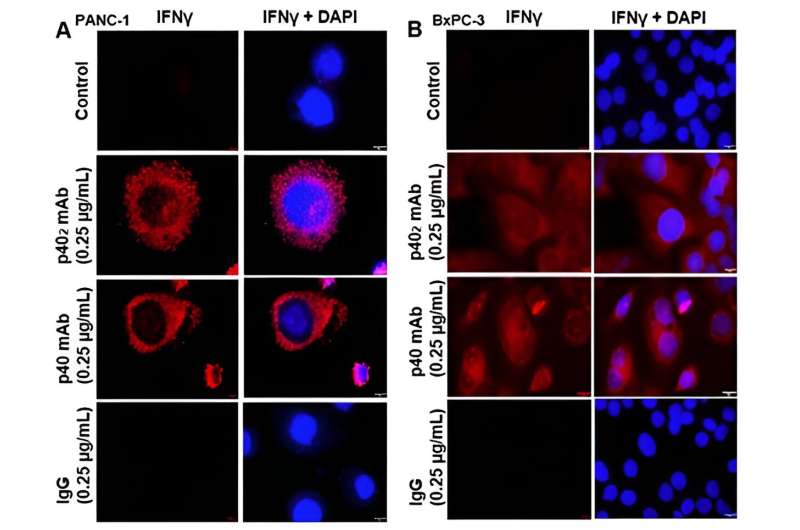This article has been reviewed according to Science X's editorial process and policies. Editors have highlighted the following attributes while ensuring the content's credibility:
fact-checked
peer-reviewed publication
trusted source
proofread
New potential immunotherapies for pancreatic cancer

Pancreatic cancer can be a devastating diagnosis due to its extremely aggressive nature and low survival rate. But there may be hope on the horizon thanks to scientists at RUSH who have discovered two new targets for decreasing the progression of pancreatic cancer.
"Our findings highlight promising avenues of treatment for one of the deadliest cancers with limited available options," said Kalipada Pahan, Ph.D., the Floyd A. Davis Professor of Neurology at RUSH and lead investigator of the study published in the journal Cancers.
To identify effective targets for stimulating the death of pancreatic cancer cells and stopping the progression of pancreatic cancer, the authors directly analyzed the serum of pancreatic cancer patients and healthy persons and found two substances. Then they used monoclonal antibodies (man-made proteins that neutralize targeted cells) to stop these two substances that promote the growth of cancer cells.
The researchers reported that monoclonal antibodies against interleukin (IL)-12 p40 homodimer and IL-12 p40 monomer may be used as new immunotherapies for pancreatic cancer. IL-12 is a family of cytokines, which are substances secreted by cells within the immune system that have an effect on other cells. They play an important role in infection with four components, IL-12, IL-23, p40 homodimer, and p40 monomer.
Of the four components, only IL-12 and IL-23 were considered bioactive, and the last two (p40 homodimer and p40 monomer) were thought to be nonfunctional ones.
"We were surprised to find a specific increase in p40 homodimer and p40 monomer in the serum of pancreatic cancer patients when compared to healthy individuals," Pahan said.
Similarly, human pancreatic cancer cells also produced higher levels of p40 homodimer and p40 monomer than normal human pancreatic cells.
"It was very pleasing to see the death of human pancreatic cancer cells, but not normal pancreatic cells, by these monoclonal antibodies," Pahan said. "Interestingly, it appears that the two so-called inactive members of our immune system are helping pancreatic cancer cells to grow."
According to this study, p40 homodimer monoclonal antibody and p40 monomer monoclonal antibody could be used as immunotherapies for pancreatic cancer.
"If these results are replicated in cancer patients, it would open up a promising avenue of treatment for this devastating group of diseases," Pahan said.
After monoclonal antibody treatment, the authors also found a sharp rise in tumor-killing interferon-gamma production, which is a cytokine that plays an important role in causing and amplifying different immune responses. They also saw an increase in pancreatic tumor death and reduction in pancreatic tumor size in patient-derived xenograft mouse model. In this model, pancreatic cancer tissues from patients are transplanted in nude mice designed to have a deficient immune system.
Pancreatic cancer is a highly malignant cancer commonly detected at advanced stages because it does not typically cause symptoms until after it has spread to other organs. It accounts for about 3% of all cancers in the U.S. and has the lowest five-year relative survival rate at only 12%. Pancreatic ductal adenocarcinoma is the most common type of pancreatic cancer.
More information: Monica Sheinin et al, Neutralization of p40 Homodimer and p40 Monomer Leads to Tumor Regression in Patient-Derived Xenograft Mice with Pancreatic Cancer, Cancers (2023). DOI: 10.3390/cancers15245796




















